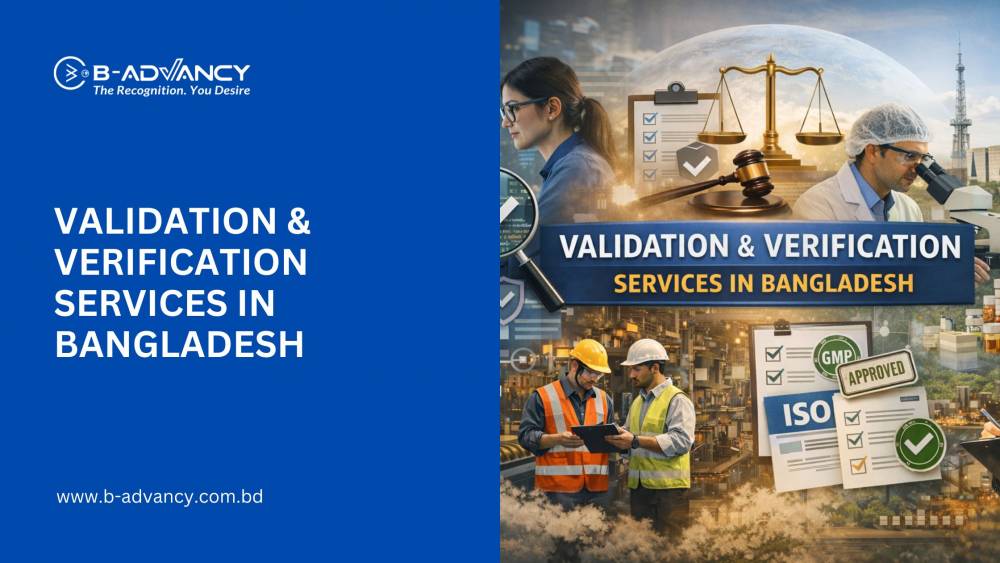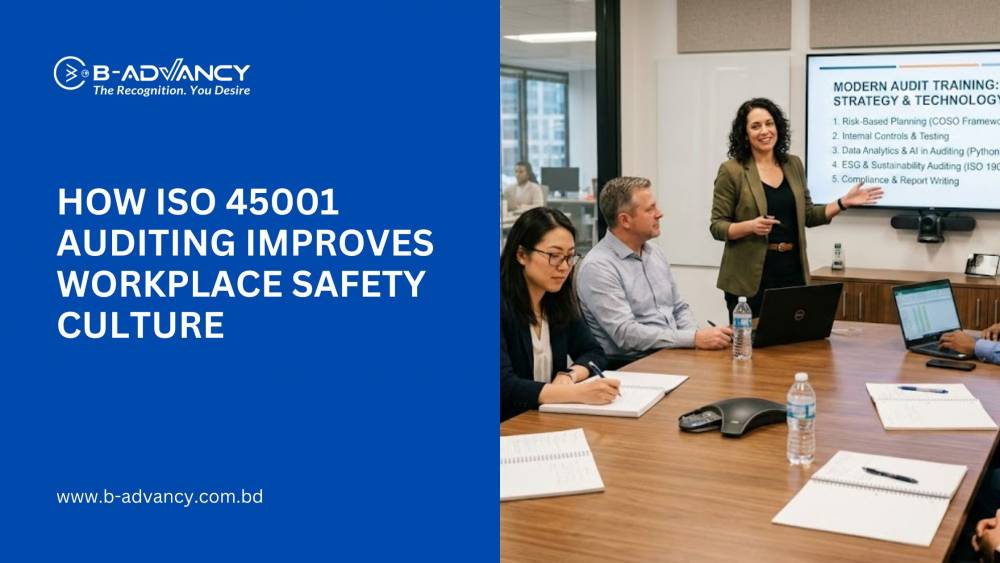The shipping and freight industry is a critical component of Bangladesh’s economy, playing a vital role in international trade and supply chain management. As the industry continues to grow, maintaining high standards of safety, efficiency, and environmental responsibility is essential. ISO certification provides a globally recognized benchmark that helps companies in the shipping and freight industry achieve these standards, ensuring they remain competitive both locally and internationally. In this blog, we will explore the importance of ISO certification for the shipping and freight industry in Bangladesh, the relevant ISO standards, the benefits they offer, and how you can begin your certification journey with B-ADVANCY Certification Limited. We will also include references to related authorities in Bangladesh.
What is ISO Certification and Why is it Important for the Shipping and Freight Industry?
ISO certification is an accreditation from the International Organization for Standardization (ISO) that signifies a company’s compliance with internationally recognized management system standards. For the shipping and freight industry, ISO certification is crucial for demonstrating a commitment to quality, safety, and environmental sustainability, which are key factors in building trust with clients, partners, and regulatory bodies.
In Bangladesh, the shipping and freight sector is a cornerstone of the economy, facilitating the movement of goods both domestically and internationally. Adopting ISO standards helps companies in this sector ensure that their operations meet consistent quality and safety requirements, minimize risks, and enhance their market competitiveness. Furthermore, ISO certification can simplify compliance with international trade regulations, which is vital for companies involved in global logistics.
Key ISO Standards for the Shipping and Freight Industry
Several ISO standards are particularly relevant for the shipping and freight industry in Bangladesh:
ISO 9001:2015 - Quality Management Systems
ISO 9001:2015 is essential for companies in the shipping and freight industry to establish a robust quality management system. It ensures that services meet customer and regulatory requirements consistently, leading to improved customer satisfaction and operational efficiency.
ISO 14001:2015 - Environmental Management Systems
With the shipping and freight industry having a significant environmental impact, ISO 14001:2015 helps companies manage their environmental responsibilities. This standard promotes sustainability by guiding companies in reducing their environmental footprint, including managing emissions, waste, and resource consumption.
ISO 45001:2018 - Occupational Health and Safety Management Systems
Safety is a major concern in the shipping and freight industry, where workers are exposed to various hazards. ISO 45001:2018 provides a framework for identifying and mitigating these risks, ensuring a safer working environment.
ISO 28000:2022 - Security Management Systems for the Supply Chain
This standard is specifically designed for the shipping and freight industry, focusing on security management throughout the supply chain. It helps companies manage risks related to security threats, ensuring the safety of goods and services from production to delivery.
ISO 50001:2018 - Energy Management Systems
Energy efficiency is critical in the shipping and freight industry, particularly in reducing fuel consumption and emissions. ISO 50001:2018 guides companies in optimizing their energy use, leading to cost savings and a reduced environmental impact.
Benefits of ISO Certification for the Shipping and Freight Industry in Bangladesh
Improved Service Quality and Customer Satisfaction
ISO certification ensures that shipping and freight services are delivered with consistent quality, meeting customer expectations and regulatory requirements. This leads to higher customer satisfaction and loyalty.
Enhanced Operational Efficiency and Cost Reduction
Implementing ISO standards allows companies to streamline their processes, reduce waste, and minimize errors. This not only improves efficiency but also results in significant cost savings, particularly in fuel and resource management.
Stronger Compliance with International Regulations
ISO standards help companies comply with both local and international regulations, which is critical for operating in the global shipping and freight market. Compliance reduces the risk of legal issues and operational disruptions.
Increased Market Competitiveness
ISO certification is an internationally recognized mark of quality that can give shipping and freight companies a competitive edge. It helps attract new clients, partners, and investors, both locally and internationally.
Facilitation of International Trade
ISO certification aligns shipping and freight companies with global standards, making it easier to enter and compete in international markets. This is particularly important for Bangladeshi companies looking to expand their reach in the global supply chain.
Steps to Achieve ISO Certification for Your Shipping and Freight Business
Achieving ISO certification involves several key steps:
Initial Assessment and Gap Analysis
Start by assessing your current processes against the requirements of the relevant ISO standard. Identify gaps and areas that need improvement to meet the certification criteria.
Develop and Implement a Management System
Design and implement a management system that complies with the chosen ISO standard. This may involve documenting processes, setting objectives, and training employees on new procedures.
Internal Audit and Management Review
Conduct internal audits to ensure your management system is effective and compliant. Regular management reviews are essential to address any issues and drive continuous improvement.
Select a Certification Body
Choose a reputable certification body, such as B-ADVANCY Certification Limited, to conduct an external audit. Prepare thoroughly for this audit to demonstrate compliance with the ISO standard.
Achieve Certification and Commit to Ongoing Improvement
After a successful audit, you will receive ISO certification. It’s important to maintain and improve your management system to retain certification and continue benefiting from it.
Relevant Authorities in Bangladesh
For more information and guidance on ISO certification and regulatory requirements in the shipping and freight industry in Bangladesh, you can refer to the following authorities:
-
Bangladesh Shipping Corporation (BSC): The state-owned shipping corporation responsible for the national maritime sector. Visit BSC
-
Department of Shipping, Bangladesh: The government agency responsible for maritime administration, including shipping, ports, and marine safety. Visit Department of Shipping
-
Bangladesh Freight Forwarders Association (BAFFA): The national association for freight forwarders in Bangladesh, providing support and guidelines for best practices. Visit BAFFA
-
Chittagong Port Authority (CPA): The authority overseeing the largest seaport in Bangladesh, crucial for the shipping and freight industry. Visit CPA
B-ADVANCY Certification Limited can guide you through these challenges with expert support, making the certification process more manageable and efficient. To contact them: Email: bangladesh@b-advancy.com | Call: +8801612264559
Conclusion
ISO certification is more than just a credential for the shipping and freight industry in Bangladesh; it is a strategic investment that can significantly enhance service quality, operational efficiency, and market competitiveness. By aligning your processes with internationally recognized standards, your business can achieve consistent service delivery, improve customer satisfaction, and gain a competitive edge in both local and global markets. While the certification journey may present some challenges, the long-term benefits far outweigh the initial efforts.





































































































































































































